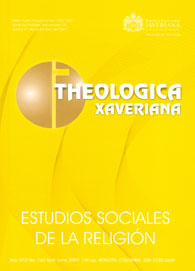Abstract
Pese a ser un campo académico poco desarrollado, el lenguaje filosófico hindú ha penetrado en la mentalidad occidental. Aunque conceptos como yoga, karma o reencarnación han entrado en el discurso occidental, han sido apropiados con una tendencia a promover nociones predeterminadas del sí mismo y no a representar algo propiamente hindú. Por esta razón tales discursos reflejan más bien formas de pensamiento occidental. Este artículo analiza el concepto de “sí mismo” como ha sido desarrollado en textos sánscritos primitivos, incluyendo el Sâmkhyakârika y los escritos del pensador del vedânta OEankara, para mostrar que las nociones occidentales del sí mismo presentan un marco por completo inadecuado para interpretar el sí mismo hindú.
This journal is registered under a Creative Commons Attribution 4.0 International Public License. Thus, this work may be reproduced, distributed, and publicly shared in digital format, as long as the names of the authors and Pontificia Universidad Javeriana are acknowledged. Others are allowed to quote, adapt, transform, auto-archive, republish, and create based on this material, for any purpose (even commercial ones), provided the authorship is duly acknowledged, a link to the original work is provided, and it is specified if changes have been made. Pontificia Universidad Javeriana does not hold the rights of published works and the authors are solely responsible for the contents of their works; they keep the moral, intellectual, privacy, and publicity rights.
Approving the intervention of the work (review, copy-editing, translation, layout) and the following outreach, are granted through an use license and not through an assignment of rights. This means the journal and Pontificia Universidad Javeriana cannot be held responsible for any ethical malpractice by the authors. As a consequence of the protection granted by the use license, the journal is not required to publish recantations or modify information already published, unless the errata stems from the editorial management process. Publishing contents in this journal does not generate royalties for contributors.


